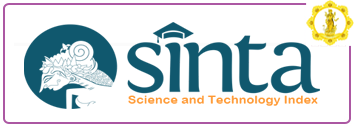KESADARAN ORANG TUA BUDDHIS PADA PENDIDIKAN SEKS UNTUK ANAK USIA SD
DOI:
https://doi.org/10.25078/jpm.v10i01.3385Keywords:
Buddhist parental awareness, sex education, elementary school-age childrenAbstract
The background of this research is the phenomenon of sex education among Buddhist parents. The objective of this research is to describe the awareness of Buddhist parents in Getasan District, Semarang Regency, concerning sex education for elementary school-age children. This research uses a qualitative approach with the type of case study research. The subjects consist of Buddhist parents in Getasan District, Semarang Regency, who had elementary school-age children aged 6–12 years. The method of data collection is done by using interviews, observation, and documentation. Data analysis is carried out through the stages of data reduction, data display, and verification, as well as drawing conclusions. The importance of sex education for elementary school-age children encompasses aspects such as education based on learning outcomes and parental awareness, understanding grounded in explanations of the anatomy and reproductive organs of both genders, knowledge based on the impact of sexual harassment and violence, the inculcation of love and adherence to five moral rules in children, and measures for preventing and addressing sexual violence; (2) Influential factors on Buddhist parents concerning sex education for elementary school-age children include parental knowledge and child-rearing approaches, parental role modeling, family financial status, peer influence, and community dynamics; (3) The role of Buddhist parents in sex education for elementary school-age children involves guiding children to perform virtuous deeds, being a child’s friends, serving as role models, explaining methods to prevent violence against children through the implementation of the five precepts (moral code of conduct) and shame of evil and fear of its result, loving-kindness and the noble eightfold path, as well as highlighting the significance of Buddhist values for the well-being of children.
Downloads
References
Adebola, Olukemi Grace and Adebola, Femi Barnabas. (2015). Family characteristics: Indices of adolescents’ sexual behaviour International Journal of Science and Technology Educational Research Vol. 6(2).
Allen, K. P., Livingston, J. A., & Nickerson, A. B. (2020). Child sexual abuse prevention education: A qualitative study of teachers’ experiences implementing the Second Step Child Protection Unit. American Journal of Sexuality Education, 15(2), 218-245.
Barua, Neeru. (2021). The Role of Religious Leaders in the Light of Buddhism to Prevent the Perpetration of Violence against Women and Children. Diakses 13 April 2023 dari https://blogs.icrc.org/religion-humanitarianprinciples/wpcontent/uploads/sites/114/2021/04/Neeru-Barua.pdf
Hartman, C. R., & Burgess, A. W. (1989). Sexual abuse of children: Causes and consequences. Child maltreatment: Theory and research on the causes and consequences of child abuse and neglect, 95-128.
KPPPA. Data Statistik Kekerasan terhadap anak. Diakses pada 11 Februari 2022 dari https://kekerasan.kemenpppa.go.id/ringkasan.
Medhācitto, Tri Saputra. (2019). Solusi dari Bebeberapa Masalah Sosial dalam Kajian Sosiologi Buddhis. Semarang: Bintang Kreasi.
Medhācitto, Tri Saputra. (2022). Aspek Sosiologi dalam Sigālovāda Sutta. Semarang: Bintang Kreasi.
Medhācitto, Tri Saputra. (2023). Buddhisme sebagai Agama & Filsafat. Semarang: STAB Syailendra.
Megawatiningtyas, Devi., Dea Resti Ameliandari, Ali Mustadi. (2018). Ex-Education in Primary School: Between Taboo and Urgency. Proceeding of International Conference on Child-Friendly Education, Universitas Muhammadiyah Surakarta, April 21st-22nd, 2018
Mullen, P. E., Martin, J. L., Anderson, J. C., Romans, S. E., & Herbison, G. P. (1994). The effect of child sexual abuse on social, interpersonal and sexual function in adult life. The British Journal of Psychiatry, 165(1), 35-47.
Nanamoli & Bodhi. (2009). The Middle Length Discourses of the Buddha. Boston: Wisdom Publication.
Norma, K.R. (Ed). (2001). The Group of Discourses (Sutta Nipāta). Oxford: The Pali Texts Society.
Nyanatiloka. (1996). Buddhist Dictionary. 2nd ed. Taiwan: The coorporate Body of the Buddha Educatioan Foundation.
Rahayu, N. K. S., & Wiarta, I. W. (2021). Hubungan Tingkat Pendidikan dan Perhatian Orang Tua dengan Prestasi Belajar Siswa Kelas IV SD. Jurnal Ilmiah Pendidikan Profesi Guru, 4(2), 308–318. https://doi.org/10.23887/jippg.v4i2.33044
Saptohutomo, Aryo Putranto. "FSGI Ungkap 117 Pelajar Jadi Korban Kekerasan Seksual Sepanjang 2022", Diakses 11 Februari 2023 dari https://nasional.kompas.com/read/2023/01/02/20313821/fsgi-ungkap-117-pelajar-jadi-korban-kekerasan-seksual-sepanjang-2022.
Senja, Atreya. (2020). The Important of Sex Education for Kids. Yogyakarta: Brilliant.
Shakeshaft, C., & Cohan, A. (1995). Sexual abuse of students by school personnel. Phi Delta Kappan, 76(7), 512.
Shin, H., Lee, J. M., & Min, J. Y. (2019). Sexual knowledge, sexual attitudes, and perceptions and actualities of sex education among elementary school parents. Child Health Nursing Research, 25(3), 312.
Sudrajat, Tata., Andri Yoga Utami, Rendiansyah Putra Dinata, M. Ihsan, Kholis Bachar Bakri. (2020). Pedoman Pencegahan dan Penanggulangan Tindak Kekerasan di Sekolah Dasar. Jakarta: Direktorat Sekolah Dasar Direktorat Jenderal Pendidikan Anak Usia Dini, Pendidikan Dasar, dan Pendidikan Menengah Kementerian Pendidikan dan Kebudayaan.
Topping, K. J., & Barron, I. G. (2009). School-based child sexual abuse prevention programs: A review of effectiveness. Review of educational research, 79(1), 431-463.
Tsuda, S., Hartini, S., Hapsari, E. D., & Takada, S. 2017. Sex Education in Children and Adolescents with Disabilities in Yogyakarta, Indonesia from a Teachers’ Gender Perspective. Asia Pacific Journal of Public Health, 7–10.
Walshe, M.O’c. (2007). Seksualitas dalam Buddhisme. Terjemahan Willi Yandi Wijaya. Insight: Yogyakarta.
Whatley, M., & Trudeil, B. (1989). Sexual abuse prevention and sexuality education: Interconnecting issues. Theory into Practice, 28(3), 177-182.
Woodward, F.L. (Ed.). (2003). The Book of Gradual Saying, vol. V (Aṅguttara
Nikāya). Oxford: The Pali Text Society.
Wurtele, S. K., & Kenny, M. C. (2010). Partnering with parents to prevent childhood sexual abuse. Child Abuse Review: Journal of the British Association for the Study and Prevention of Child Abuse and Neglect, 19(2), 130-152.








